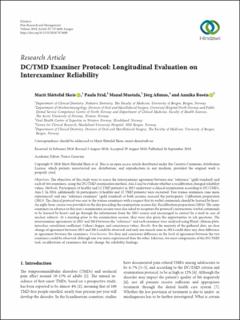DC/TMD Examiner Protocol: Longitudinal Evaluation on Interexaminer Reliability
Skeie, Marit Slåttelid; Frid, Paula Hanna Therese; Mustafa Sharafeldin, Manal Ibrahim; Assmus, Jörg; Rosén, Annika
Peer reviewed, Journal article
Published version

Åpne
Permanent lenke
https://hdl.handle.net/1956/20005Utgivelsesdato
2018-09-26Metadata
Vis full innførselSamlinger
Originalversjon
https://doi.org/10.1155/2018/7474608Sammendrag
Objectives. The objectives of this study were to assess the interexaminer agreement between one “reference” (gold standard) and each of two examiners, using the DC/TMD examination method, Axis I and to evaluate whether a recalibration changed reliability values. Methods. Participants (4 healthy and 12 TMD patients) in 2013 underwent a clinical examination according to DC/TMDs, Axis I. In 2014, additionally 16 participants (4 healthy and 12 TMD patients) were recruited. Two trainee examiners (one more experienced) and one “reference examiner” (gold standard) at both sessions assessed the participants. Calibration preparation (2013): The clinical protocol was sent to the trainee examiners with a request that its verbal commands should be learned by heart. An eight-hour-course was provided on the day preceding the examination session day. Recalibration preparation (2014): The same examiners in advance to this year’s examination session were also asked to recapture the protocol’s instructions (verbal commands to be learned by heart) and go through the information from the 2013 course and encouraged to contact by e-mail in case of unclear subjects. At a meeting prior to the examination session, they were also given the opportunities to ask questions. The interexaminer agreements in 2013 and 2014 between the “reference” and each examiner were analysed using Bland–Altman plots, intraclass correlation coefficient, Cohen’s kappa, and consistency values. Results. For the majority of the gathered data, no clear change of agreement between 2013 and 2014 could be observed, and only one muscle zone in 2014 could show any clear difference in agreement between the examiners. Conclusions. No clear and consistent difference in the level of agreement between the two examiners could be observed, although one was more experienced than the other. Likewise, for most components of the DC/TMD tool, recalibration of examiners did not change the reliability findings.
